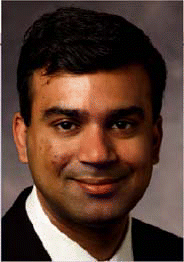The determined pursuit of physicians by PCRs is unsurprising to Brad Marple, MD, of the University of Texas Southwestern Medical School in Dallas. Dr. Marple is an otolaryngologist and AAOA board member (as well as an editorial board member of ENToday). Busy with his clinical practice and students, Dr. Marple has little time for face-to-face visits with PCRs, who frequently visit his office to leave samples. Occasionally, PCRs will leave a peer-reviewed journal article or a chart summarizing a journal article pertinent to an otolaryngology practice. “That is in line with my preferred method of getting information about clinical developments and new medications, which is through peer-reviewed journal articles,” he says. “I approach PCR visits with a jaundiced eye because their job is marketing. Peer-reviewed sources and CME are more regulated,” he adds. He attends professional conferences sponsored by pharmaceutical companies as long as they disclose their interests, checking with the Chicago-based Accreditation Council for Continuing Medical Education (ACCME) if he has questions about a conference’s sponsorship or intent. As for being a “slow” or “fast” learner, Dr. Marple was surprised that companies track physicians in those terms: “For some companies I must be seen as a slow learner and a fast learner by others because the variables by which I’m judging medications are different than what they think is important.”
Explore This Issue
December 2006Dr. Krouse dismisses the notion that prescribing patterns have anything to do with how fast or slow physicians are on the uptake. Rather, he sees colleagues with different prescribing styles: some jump on a new product, some wait for reviews of clinical results, whereas others stick with familiar drugs.

Official Curbs?
Fortunately, physicians have official allies in keeping PCR behavior and the pharmaceutical industry in check. According to Karen Mahoney, the US Food and Drug Administration’s (FDA’s) trade press liaison, regulations on pharmaceutical sales representatives’ promotions to physicians “should not be false, not be misleading, and should include material facts such as risk information about a prescription.” FDA regulations do not address data collected on prescribing patterns or what gifts may be offered to physicians. Ms. Mahoney suggests that if a physician has a concern about the content of promotion, he or she should contact the FDA’s Division of Drug Marketing, Advertising, and Communications.
That’s what Dr. Krouse recommends for colleagues who have had unpleasant dealings with PCRs and whose complaints to the PCRs’ supervisors haven’t brought about disciplinary action. “Alerting the FDA when a PCR’s message is off label or who makes claims not supported by the label is the right channel for a physician to pursue in such cases,” he says.

Leave a Reply